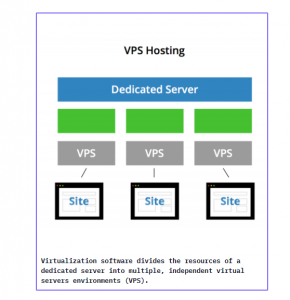What is a VPS?
VPS is a short for Virtual Private Server. Essentially a VPS is a virtualized server that operates like a real (dedicated) independent server.
Virtualization software is used to build a VPS, which divides the resources of one dedicated server into multiple virtual servers (VPS). Each VPS is assigned a set amount of CPU, RAM, and bandwidth.

How does VPS hosting work?
Generally, you can rent a VPS from a hosting company that houses dedicated servers in a data centre.
Thousands of virtual servers could be housed in one single server. But each VPS does have its own resources and operating system. So, it just works as a dedicated server but at a fraction of the cost.
It is a hosting solution that is hugely popular and flexible, carving out a middle ground between shared hosting and hosting dedicated servers.
A private virtual server provides you with better performance than shared hosting, lower prices than dedicated hosting and greater flexibility over either of the other options.
So, is VPS is the right host for you?
Why choose a VPS over other hosting options?
VPS Hosting vs Share Hosting
Think of shared hosting like a huge open office—everyone has their own desk but they’re essentially sharing the same space and stealing each other’s yogurt out of the fridge from time to time.
VPS hosting is more like individual offices in a high-rise building, each with a lock on the door. And their own refrigerator.
Performance in shared hosting is unpredictable, as many accounts share the same server without restrictions. And that means your site might experience performance issues if traffic spikes on another site on the server you’re sharing.
A VPS lets you utilize the maximum server resources allocated to you.
Depending on the provider, you may even be able to scale these resources when needed. VPS hosting also gives you more control over your security.
You (or your host, in a managed service) are responsible for managing the security of your server— meaning that your VPS security is as strong as you make it. On a shared server, on the other hand, all accounts share the same environment. An affected site on the server could cause damage to your site, even if your site security is strong.
VPS Hosting vs Dedicated Server Hosting
A dedicated server is an entire physical server reserved just for you.
And that sounds great, right?
Well, in some ways it is. Dedicated server hosting guarantees maximum performance, zero sharing of resources, and the best security, as no one else shares CPU cycles with your applications.
But the cost of running and maintaining a dedicated server is just too high for most small companies and many larger ones too.
You’ll need an in-house or outsourced system administrator for managing, patching, and upgrading the server. And when it’s time to scale up you must purchase hardware and send someone to the rack to put it in.
A VPS is functionally equivalent to a dedicated server, and much more affordable. With the right specs, it can offer a similar level of performance. A VPS is also easily scalable– in many cases, you can add new virtual resources in real-time with just a few clicks.
And because your virtual private server is isolated from other virtual servers on the hardware, your security is as strong as you make it.
Types of VPS Hosting: Managed vs Unmanaged
You can either run your own VPS or pay a hosting company to do it for you, depending on your level of experience (and how much you want to spend):
Managed VPS
In fact, a Managed VPS is two products in one: a VPS and a service contract which facilitates your hosting experience. You will still have full control over your server, but you will also receive support from the engineers who can help you install software, update your server and keep it safe. We can also help you restore your website after a potential cyber-attack, or take full server backups, depending on the level of service.
Unmanaged VPS
An unmanaged VPS is a rawer experience on servers.
With a pre-installed operating system, you will have access to the server, but from scratch, you will have to install most of everything else you want on your box. You will also need to configure your own safety.
Which means that you must either learn how to do it or find someone to do it for you. Many VPS providers offer basic services for an additional charge, such as one-click software stack installs and automatic snapshot backups.
An unmanaged VPS is perfect both for seasoned server administrators and budding developers and students alike.



